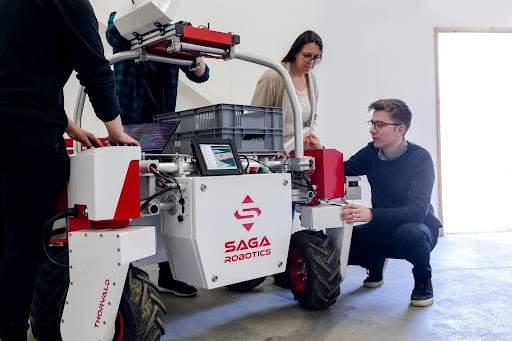Crafting a Career in Robotics and AI: High-Paying Skills and Projects That Inspire

There’s no doubt that AI and robotics are specialties that are likely to grow exponentially over the next few years. They’ve already done so, and that growth has created diverse career paths, including roles in machine learning, robotics engineering, and hardware design. With advancements happening at a hard-to-wrap-your-head-around pace, robotics and AI fields need the help of tech-focused workers, and there’s no better time to hop aboard and start building your skills for the future.
Essential Skills for Robotics and AI Careers
Mastering high-paying computer science skills is a must for anyone pursuing robotics and AI. These abilities open doors to cutting-edge roles and command top salaries in the tech industry. Here are some of the most valuable skills to focus on:
- Machine learning and artificial intelligence: Designing systems that learn and improve over time is central to robotics and AI. Neural networks, natural language processing, and data modeling help advance AI capabilities.
-
Programming: Languages like Python, C++, and Java are necessary for writing algorithms, controlling robots, and implementing AI models, so proficiency in these skills can lay a strong foundation for robotics and AI careers.
-
Cloud computing: Many robotics and AI systems rely on cloud-based platforms for data storage, processing, and remote operation. Cloud infrastructure and services like AWS, Azure, or Google Cloud develop scalable and efficient robotics solutions, especially for applications requiring real-time data access and large-scale machine learning models.
-
Cybersecurity: As robots and AI systems become more integrated into daily life, their security needs to become stronger. Adding cybersecurity to your list of skills can help you stay in demand.
Beyond foundational skills like machine learning, programming, and cybersecurity, other specialized abilities are essential for success in robotics and AI roles. One such area is hardware design and engineering. Building reliable robotics systems involves a deep understanding of physical components, including sensors, motors, and circuits. As an engineer who can integrate these components into functional designs, you can help robots perform tasks efficiently and effectively in real-world environments.
AI algorithm development skills can also set you apart. Algorithms allow robots and AI systems to process data, make decisions, and adapt to their surroundings — features that will only become more important as technology becomes more sophisticated. Robotics simulation and testing are also increasingly valuable skills to hone. Testing and refining systems before real-world deployment can reduce costs and improve the reliability of a final product.
Inspiring Robotics Projects and Innovations
The field of robotics has driven remarkable innovation in numerous industries, including the automotive and healthcare sectors. For example, autonomous vehicles, like self-driving cars and programmable drones, have made transportation more convenient and reliable. Companies like Tesla and Waymo have developed AI-powered systems to improve logistics and make driving more accessible.
In healthcare, robotics is enhancing patient care and medical accuracy. Surgical robots like the da Vinci robot allow for minimally invasive procedures, while assistive robots help with tasks like rehabilitation and elder care to improve outcomes and address labor shortages in critical fields.
Other exciting projects include Boston Dynamics’ agile robots, designed for industrial applications, and AI-powered agricultural robots, which optimize farming by automating planting, harvesting, and crop monitoring. These are excellent examples of the positive impacts robotic systems can make by solving real-world problems.
Robotics projects can also innovate industries and expand job opportunities. They require skilled professionals in areas like programming, hardware design, and robotics engineering. Emerging roles in ethics, regulation, and maintenance also increase the demand for skilled workers.
Building a Rewarding Career in Robotics and AI
If you want to work in robotics or AI, a solid educational foundation in STEM can help you achieve your goals. To gain technical expertise, pursue degrees in computer science, engineering, or related fields. Specialized courses in robotics, machine learning, and data science provide targeted knowledge that employers value.
Certifications can also boost your profile. Programs like those from Udemy, Coursera, or professional organizations offer certifications in AI, robotics programming, and cybersecurity. These credentials showcase your commitment to learning new industry-recognized skills and can give you an edge on your robotics resume.
Also, work toward finding your niche in the field. Explore areas that align with your interests, such as healthcare robotics, autonomous systems, or industrial automation. Working on personal or collaborative projects can help you discover your strengths while building a portfolio to showcase your skills.
Don’t forget to network along the way. Attend robotics competitions, industry conferences, or online robotics forums, and engage with professionals and hobbyists to find mentorship and job opportunities. Blending education with certifications, interests, and connections can help you excel in this dynamic field.
Conclusion: Navigating Your Future in Robotics and AI
Robotics and AI offer virtually endless opportunities for those ready to innovate and solve real-world challenges. This high-growth industry welcomes curious minds and skilled professionals eager to shape the future. By building the right skills and seeking out opportunities, you can create a fulfilling career in these fast-growing specialties.
Thanks for helping to keep our community civil!
This post is an advertisement, or vandalism. It is not useful or relevant to the current topic.
You flagged this as spam. Undo flag.Flag Post


